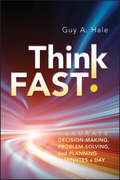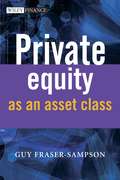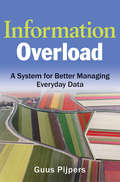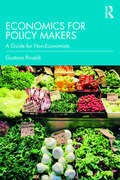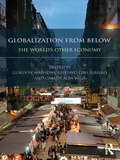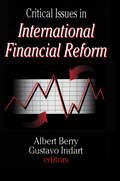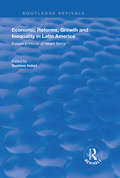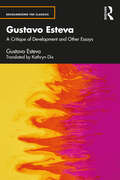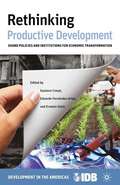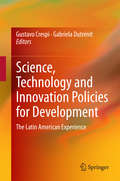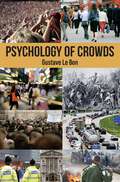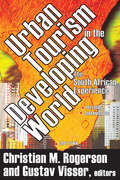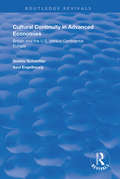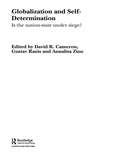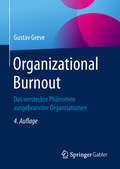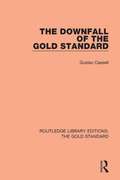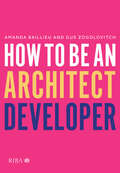- Table View
- List View
Unmasking Administrative Evil
by Guy Adams Danny BalfourThe modern age with its emphasis on technical rationality has enabled a new and dangerous form of evil--administrative evil. Unmasking Administrative Evil discusses the overlooked relationship between evil and public affairs, as well as other fields and professions in public life. The authors argue that the tendency toward administrative evil, as manifested in acts of dehumanization and genocide, is deeply woven into the identity of public affairs. The common characteristic of administrative evil is that ordinary people within their normal professional and administrative roles can engage in acts of evil without being aware that they are doing anything wrong. Under conditions of moral inversion, people may even view their evil activity as good. In the face of what is now a clear and present danger in the United States, this book seeks to lay the groundwork for a more ethical and democratic public life; one that recognizes its potential for evil, and thereby creates greater possibilities for avoiding the hidden pathways that lead to state-sponsored dehumanization and destruction. What's new in the Fourth Edition of Unmasking Administrative Evil: UAE is updated and revised with new scholarship on administrative ethics, evil, and contemporary politics. The authors include new cases on the dangers of market-based governance, contracting out, and deregulation. There is an enhanced focus on the potential for administrative evil in the private sector. The authors have written a new Afterword on administrative approaches to the aftermath of evil, with the potential for expiation, healing, and reparations.
Think Fast!: Accurate Decision-Making, Problem-Solving, and Planning in Minutes a Day
by Guy A. HaleApply proven critical thinking processes and supercharge your business Alamo Learning Systems has been providing Critical Thinking Skills (CTS), problem solving, decision-making, preventive action, and innovation training solutions to the corporate world for more than 35 years. <P><P>They have been at the forefront of such movements in management as ISO 9000, Six Sigma, and Lean Manufacturing. Now, in Think Fast!, these CTS experts bring you an up-to-the-minute toolbox of strategies and tactics you can use to optimize your business. This useful and easy-to-read guide looks at real-world consumer issues, giving you top-level skills to address a wide range of practical business, professional, and life problems. Alamo's CTS solutions have been proven effective in major companies, including 200 of the current Fortune 500 Uses real examples from outside the business world to make problems and solutions widely accessible At last, the Critical Thinking Skills that have guided some of the world's most successful companies are available to readers of this insightful guide. Start rethinking your business today, and take your business skills--and business results--to the next level.
Private Equity as an Asset Class
by Guy Fraser-SampsonGuy Fraser-Sampson draws upon twenty years' private equity experience to provide a practical guide to mastering the intricacies of this highly specialist asset class. Aimed equally at investors, professionals and business school students, it starts with such fundamental questions as "what is private equity?" and progresses to detailed analysis of venture and buyout returns. It also unveils a totally new concept which looks set to revolutionise thinking in the industry: Total Return investing. Often unfairly reviled, and frequently misunderstood, private equity differs from all other asset classes in various important respects, not least in the nature and timing of its returns, which require a whole new approach for those reared on more traditional investments such as bonds and shares. This book shows how a good grasp of the basic structure of private equity vehicles and returns (including the dreaded J-curve) can lead to full understanding of the techniques needed to measure and analyse performance. Key points include: A glossary of private equity terms Venture funds and transactions Buyout funds and transactions Understanding private equity returns Analysis of historic returns How to plan a fund investment programme How to conduct effective due diligence Total Return investing
Information Overload
by Guus PijpersWorld-class guidance on using information to achieve better performance Examining the characteristics of information and the latest findings in cognitive science, this book shows how the mind works, how it can be used to think optimally about your business, and how to improve business performance with better information management practices. Provides the process and tools necessary to identify this information and how to remember it, and how to better use the people around you to obtain the best information Reveals how to handle all of the hundreds of pieces of information received daily Provides case studies as well as checklists that show managers how to implement the methodology presented in the book Innovative and ahead of its time, this book helps you take control of all the information that enters your life, get better informed, and have more time for the important issues you face within your business.
Economics for Policy Makers: A Guide for Non-Economists
by Gustavo RinaldiCertain key economic decisions taken by organizations and indeed countries are often not made by economists but by businessmen, trade unionists, politicians and policy-makers. Those who employ people, those who represent workers, those who make laws and those who elect them need economics but may have little time or desire to study it. This book makes economics easily available to everyone. The author’s use of simple language and avoidance of technical jargon provides non-economists with a better understanding of economic reasoning and the tools "to know and to decide". The author achieves this through introducing key concepts in short presentations and arming the reader with selected press articles and recent research using these concepts. An analysis of these demonstrates how a general concept can be derived from a specific context and highlighted questions provide the basis for further debate. The reader can then focus on the parts most relevant to their own needs. This book will have great appeal to employers, trade unionists and public officials attending courses organized by international institutions, professional training providers, as well as graduate students of courses where economics is an important element, especially in relation to its policy implications. Finally, it is invaluable for anybody who has wanted to learn the basics of practical economics but has been deterred by its technicalities.
Globalization from Below: The World's Other Economy
by Gordon Mathews Gustavo Lins Ribeiro Carlos Alba VegaThis book explores globalization as actually experienced by most of the world’s people, buying goods from street vendors brought by traders moving past borders and across continents under the radar of the law. The dimensions and practices of ‘globalization from below’ are depicted and analyzed in detail by a team of international scholars. Topics covered include the ‘New Silk Road’, African traders in China, street hawking in Calcutta and pirate CDs in Mexico. The chapters provide intimate portrayals of routes, markets and people in locations across the globe and explore theories that can help make sense of these complex and fascinating case studies. Students of globalization, economic anthropology and developing-world economics will find the book invaluable.
Critical Issues in International Financial Reform
by Gustavo IndartCritical Issues in International Financial Reform addresses weaknesses of the current international financial system and potential beneficial reforms. The focus is on the countries of Latin America and the Caribbean, but the authors also take into account relevant lessons from the experience of Canada, a country highly integrated into world and hemispheric trade and financial markets.Critical Issues offers a new perspective on a discussion too often dominated by interest groups that take strong, even rigid, positions on issues with limited understanding of the technical aspects of the issues, and little concern for the interests of the developing world. Its chapters have been written by experts in the economic, political, and social aspects of the international financial integration of developing countries. Financial crises and their associated social and economic traumas are the most apparent symptom that something is amiss in the process of world economic integration. But there are also broader questions about the nature and magnitude of the benefits and costs of increased international capital flows for different groups of countries in the developing and developed worlds. For example, even in the absence of turbulence, is it optimal for all participants that capital movements be as free as possible? Does capital inflow discourage domestic savings to a degree that should cause worry? Are some types of flows inherently more beneficial than others--for instance, direct investment flows versus flows into host stock markets? How can the instability of capital movements best be curtailed? These questions concern the contributors to this volume.This volume demonstrates that the evolution of the world financial system, its various problems, and what is or is not done about them require an understanding of the links among financial, economic, and political variables. Critical Issues in International Financial Reform is an important contribution to this debate, and will be of value to researchers in economic policy, history, and international politics.Albert Berry is professor of economics at the University of Toronto and research director of the Program on Latin America and the Caribbean. Gustavo Indart is special lecturer of economics and the coordinator of the Program on Latin America and the Caribbean at the University of Toronto.
Economic Reforms, Growth and Inequality in Latin America: Essays in Honor of Albert Berry (Routledge Revivals)
by Gustavo IndartOriginally published in 2004. Growth, income distribution, and labour markets are issues of pivotal importance in the Latin American context. Examining unique theoretical issues and the empirical evidence, this book provides a critical analysis of the key elements of income distribution determinants, labour market functions, trade policies, and their interrelations. As the advance of globalization becomes seemingly unstoppable, this book provides an important reappraisal of the impact of this new phenomenon, and in particular, the pernicious impact it may have on income growth and distribution. The key objective of the volume is to integrate more fully the analysis of trade and labour market economists, in order to better understand the labour market and income distribution implications of globalization and international integration. Forty years after the early calls to appropriately investigate the micro foundations of macroeconomics, the separation of the two at the policy level is more damaging than ever before - particularly for developing regions; this volume therefore makes an important contribution at the theoretical and policy levels by bringing together macroeconomic and microeconomic analyses.
Defence Economics and Innovation (Elements in Defence Economics)
by Gustavo Fornari Dall'AgnolThis Element presents an analytical model for assessing the success or failure of innovative large-scale defence projects. To achieve this goal, it constructs a theoretical model based on a three-angle analysis: the International System, the innovative potential, and the domestic political arena. Each angle of analysis generates an independent variable, namely: level of threat, technological feasibility, and political consensus. It is held that technological feasibility and political consensus are necessary and conjointly sufficient conditions to explain the success or failure of large-scale defence projects. The success of the innovative defence projects is strongly and positively related to the level of external threat. The initial hypothesis is tested by scrutinizing three specific projects in the United States (Future Combat Systems, The B-2 Stealth Bomber and the F-35). The conclusion is that the model is sound and might be generalized to analyse the prospects of success or failure of other large-scale defence projects.
Gustavo Esteva: A Critique of Development and other essays (Decolonizing the Classics)
by Gustavo EstevaIn his reflections on decolonization and post-development, Gustavo Esteva forged a unique synthesis of critical theory and political economy. This book presents more than half a century of "reflection in action" in the form of essays, books, and interventions in national and international forums and newspaper articles—most published here for the very first time. It showcases Esteva’s evolving thought on economic theory, social change, revolutionary subjectivity, transition, development, the challenges of a new era and personal and communal autonomy, all associated with the challenges and advances in the construction of a new society. Through this translation, Esteva’s writings engage with many of the important cultural and political debates of the present day and retain their power both to provoke and move the reader. Readers will see a thinker at work, formulating local, grassroots alternatives as they are emerging in Mexico and Latin America, with a keen sensibility to what happens in other regions of the world. Gustavo Esteva: A Critique of Development and Other Essays offers a lucid insight into the climatic and sociopolitical collapses we face and will be of interest to students and scholars of critical theory, post-colonial and de-colonial studies, and post-development studies.
Rethinking Productive Development
by Gustavo Crespi Ernesto Stein Eduardo Fernández-AriasRethinking Productive Development systematically analyzes policies in key areas such as innovation, new firms, firm networks, financing, human capital, and internationalization.
Science, Technology and Innovation Policies for Development
by Gustavo Crespi Gabriela DutrénitThis book examines the implementation of science, technology and innovation (STI) policy in eight Latin American countries and the different paths these policies have taken. It provides empirical evidence to examine the extent to which STI policies are contributing to the development of the region, as well as to the solution of market failures and the stimulus of the region's innovation systems. Since the pioneering work of Solow (1957), it has been recognized that innovation is critical for economic growth both in developed and in less-developed countries. Unfortunately Latin America lags behind world trends, and although over the last 20 years the region has established a more stable and certain macroeconomic regime, it is also clear that these changes have not been enough to trigger a process of innovation and productivity to catch-up. Against this rather grim scenario there is some optimism emerging throughout the region. After many years of inaction the region has begun to invest in science, technology and engineering once again. Furthermore, after many changes in innovation policy frameworks, there is now an emerging consensus on the need for a solution to coordination failures that hinder the interaction between supply and demand. Offering an informative and analytic insight into STI policymaking within Latin America, this book can be used by students, researchers and practitioners who are interested in the design and implementation of innovation policies. This book also intends to encourage discussion and collaboration amongst current policy makers within the region.
Las parejas inteligentes enriquecen juntas
by Gustavo Cerbasi¿Cuándo fuela última vez que usted y su cónyuge hablaron de sus finanzas?Hoy en día demasiados cónyuges no se sientan juntos para evaluar susfinanzas. Muchasveces a las esposas se les ha delegado el complejo deber de balancear,manejary pagar las cuentas. La falta de comunicación en las finanzas tambiénse refleja en la comunicación del matrimonio. Muchas veces las familiasque por fuera parecentenerlo todo bajo control, por dentro están completamente enbancarrota. Gustavo Cerbasiayuda a guiar a las parejas, combinando tanto la teoría como losejercicios prácticos, mientras comunican, planifican y funcionanfinancieramente como una unidad familiar.
Original Sin and Procylical Fiscal Policy: Two Sides of the Same Coin?
by Gustavo AdlerA report from the International Monetary Fund.
Club Atletico Boca Juniors
by Anita Elberse Gustavo A. Herrero Alberto BallveClub Atletico Boca Juniors is the most popular soccer club in Argentina and one of the most decorated clubs in the world. Throughout its storied history, the club has recruited and developed dozens of star players. In his eleven years at Boca Juniors, president Mauricio Macri has significantly increased the club's net worth and annual revenues. However, he faces a constant challenge to remain competitive on and off the field. In November 2006, Macri is approached by Spanish and Italian soccer powerhouses, seeking to purchase the players Fernando Gago and Rodrigo Palacio. Should Macri enter negotiations with the clubs interested in buying the star players? If so, how should they approach the talks? Allows for an in-depth examination of Boca Junior's business model, and how it differs from that of the richer soccer clubs in Western Europe. Also enables an assessment of successful talent and brand management strategies in the context of a sports franchise with a worldwide reach.
Psychology of Crowds
by Gustave Le BonIn this clear and vivid book, Gustave Le Bon throws light on the unconscious irrational workings of group thought and mass emotion as he places crowd ideology in opposition to free-thinking and independent minded individuals. He also shows how the behaviour of an individual changes when she/he is part of a crowd.Le Bon was an eminent psychologist and sociologist. The ideas le Bon explores in this book are extremely relevant to today's society and were of pivotal importance in the early years of group psychology: Sigmund Freud's Massenpsychologie und Ich-Analyse (1921); (English translation Group Psychology and the Analysis of the Ego, 1922) was based on Le Bon's work. Applications include financial market behaviour and political delusions.The original of this work, La Psychologie des Foules, was first translated anonymously into English possibly by a group of French students. Sparkling Books has corrected errors and anomalies in the original translation by reference to the Alcan edition. We have shortened a few passages but maintained the original footnotes and have added some footnotes of our own. Contents>Book One - The Mind of Crowds General characteristics of crowds and the psychological law of their mental unity The sentiments and morality of crowds The ideas, reasoning power, and imagination of crowds The religious nature of crowd convictions Book Two - The Opinions and Beliefs of Crowds Indirect factors of the opinions and beliefs of crowds Direct factors of the opinions of crowds The leaders of crowds and their means of persuasion Fixed beliefs and changeable opinions of crowds Book Three - The Classification and Description of the Different Kinds of Crowds The classification of crowds Crowds committing crimes Criminal juries Electoral assemblies
Urban Tourism in the Developing World: The South African Experience
by Gustav VisserOver the past decade, the field of urban tourism has consolidated with the appearance of several books that concentrate upon the Western European and North American experience. Recently, the scope and range of urban research has widened considerably, including the welcome appearance of studies that examine the tourism phenomenon in cities outside the Euro-American heartland.Despite this growing international body of debate and scholarship on tourism and cities, particularly in the developed North, literature that relates to the developing world as a whole, and to Africa in particular, remains sparse. The task of Urban Tourism in the Developing World: The South African Experience is to augment the current international scholarship concerning urban tourism in the developing world. More especially, the contributors draw attention to a range of case studies from South Africa that provide some starting points to address the uneven scholarly coverage of urban tourism the African context has received to date. In addition, the research material presented here seeks to contribute toward raising the South African, and indeed the African profile, within growing international scholarship concerning issues of urban tourism and development.This collection aims to expand an emerging South African and African tourism research "voice" concerning the tourism and development nexus, as well as to stem critiques that this body of research appears to have developed in a theoretical vacuum, divorced from broader international tourism research discourses. This collection of essays not only further develops an independent South African tourism perspective, but also presents research that is closely tied to international urban tourism research debates. In addition, this analysis of urban tourism in the South African context enriches the rather Western-oriented theories of urban tourism discourse through its emphasis on how urban tourism is evolving in urban Africa.
German Economy, 1870-1940: Issues and Trends (Routledge Library Editions: The German Economy #12)
by Gustav StolperOriginally published in 1940, this book remains an illuminating and forceful survey of the economic development of modern Germany. It reveals for the first time the basic trends of German business enterprise towards central control. This survey makes three important factors clear. Firstly, the continuity in the underlying trends of German history; secondly the characteristic prevalence of 'statism' in German history; thirdly, Nazism cannot be explained on purely economic grounds: no other county showed such a striking sequel of ups and downs as that which this book illustrates in the economic history of the late 19th and early 20th centuries.
Cultural Continuity in Advanced Economies: Britain and the U.S. Versus Continental Europe (Routledge Revivals)
by Gustav SchachterOriginally published in 2005. In the past three centuries Britain, Continental Europe and the United States have all experienced remarkable continuity in terms of the character and nature of the relations between the State and the economy. In a fascinating and eminently readable account, this book examines the significance of ideology in the formation of economic policy in the two groups of countries, comparing and contrasting the minimalist state-ownership societies of Britain and the United States with the interventionist states of Continental Europe. The book uncovers a continued contrast between the economic and social individualism of Britain and the United States, and the reliance on the State typical of nations in Continental Europe. The readership will benefit from a clearer understanding of the varying degrees of intervention in both the domestic and international economic policies employed, and the illuminating comparisons between the Continentals and the more market orientated nations of Britain and the United States.
Globalization and Self-Determination: Is the Nation-State Under Siege? (Routledge Studies in the Modern World Economy #Vol. 58)
by Gustav Ranis David R. Cameron Annalisa ZinnIs the nation state under siege? A common answer is that globalization poses two fundamental threats to state sovereignty. The first concerns the unleashing of centrifugal and centripetal forces - such as increasing market integration and the activities of institutions like the IMF, World Bank, and WTO - that imperil state sovereignty from 'outside' the nation state. The second threat emanates from self-determination movements that jeopardize state sovereignty from 'inside'. Rigorously analyzing popular hypotheses on globalization's effect on state sovereignty from a broad social sciences perspective, the authors use empirical evidence to suggest that globalization's multilevel threats to state sovereignty have been overestimated. In most instances globalization is likely to generate pressure for increased government spending while only one form of market integration - foreign direct investment by multinational enterprises - appears to increase any feeling of economic insecurity. This volume will be invaluable to course instructors at both graduate and undergraduate levels, policy makers and members of the general public who are concerned about the effects of globalization on the nation-state.
Entrepreneurship Education: Scholarly Progress and Future Challenges (Routledge Focus on Business and Management)
by Gustav Hägg Agnieszka KurczewskaThe discussion around whether entrepreneurship can be taught is becoming obsolete as the number of entrepreneurship courses, specializations and degrees is rising at an unprecedented rate all over the world and the demand for entrepreneurial education teachers or instructors is constantly growing. The global community of entrepreneurial education proponents is enthusiastic about the possibility of spreading the idea of entrepreneurship, as it is believed to benefit societies and economies in addition to influencing human development on an individual level. The fervour is nurtured by public policies and the development of an enterprising culture in the public discourse. In this discourse, entrepreneurship is treated as a panacea for numerous social and economic problems. This book is a solid reference point for all who are interested in conducting research on entrepreneurial education or engaged in teaching entrepreneurship. It is a compendium of knowledge about entrepreneurial education as a research field, seen from the perspective of the last four decades, its complete contemporary history. It reviews the progress of the field from the outset to the present in terms of its socio-economic context, changes in the academic community, but also its research focus and methodological development. This uniquely comprehensive book is a resource of both knowledge on entrepreneurial education research and inspiration for future studies within the field. This timely and relevant book provides practical insights for educators when developing their teaching practice and will be of interest to entrepreneurship educators and entrepreneurship education researchers.
Organizational Burnout: Das versteckte Phänomen ausgebrannter Organisationen
by Gustav GreveErfahren Sie in diesem Buch alles rund um das Thema Managementfehler und Organizational BurnoutBleiben bei einer gut aufgestellten Unternehmensorganisation die bisherigen Erfolge aus, dann ist oft ein sogenannter Organizational Burnout (OBO) die Ursache dafür. Gustav Greve beschreibt das weit verbreitete Phänomen in diesem Buch eindrücklich und anschaulich. Seit 2010 sind 143.4751 Unternehmen in die Insolvenz gegangen - davon mindestens die Hälfte wegen Managementfehlern. Viele ausgebrannte Organisationen könnten heute noch dabei sein, wenn sie sich diesem aktuellen Phänomen souverän gestellt hätten. Aus diesem Grund schildert der Autor in seinem Buch die typischen Gründe, Symptome und Folgen des Organizational Burnout sowie eine wirksame Therapie. Er erklärt die Erfolgsdefizite der betroffenen Unternehmen und zeigt damit einen Weg aus der Krise auf. Ein sehr praxisorientiertes Fachbuch für Unternehmer, Führungskräfte und BeraterGreves Werk „Organizational Burnout“ ist ein Buch aus der Praxis für die Praxis. Es richtet sich an:EigentümerUnternehmerFührungskräfteMitarbeiter BeraterDas Werk basiert in erster Linie auf Greves Erfahrungen als Unternehmer, CEO und Unternehmensberater. Dem Autor ist es damit gelungen, ein leicht lesbares Buch über Organizational Burnout mit Tiefgang und umfassenden Begründungen zu schreiben, das nie belehrend, aber zugleich doch lehrreich ist. Greve möchte damit zeigen, wie Unternehmen den Paradigmenwechsel schaffen und neue Energie für einen organisationsmentalen Turnaround finden. Für die 4. Auflage wurde das Buch vollständig durchgesehen und aktualisiert.
The Downfall of the Gold Standard (Routledge Library Editions: The Gold Standard #2)
by Gustav CasselIn this book, originally published in 1936, the author charts the sequence of events which converted him from an advocate of the restoration of the gold standard to a convinced opponent. His indictment of the gold standard is comprehensive and he attributes it as the chief cause of the economic difficulties of the 1920s. An invaluable commentary on the monetary instability of these crucial years, this book was written not only for economists and bankers but also for those interested in following the narrative of the most tumultuous events in the history of money.
Wirtschaftliche Krisen bewältigen: Neue Erkenntnisse aus den jüngsten Krisen
by Gustav A. HornDas Fachbuch gibt einen kompakten Überblick über den aktuellen Stand der Forschung zur Bekämpfung von wirtschaftlichen Krisen. Die Gedankenwelt der Ökonomen hat sich seit der Finanzmarktkrise und der Krise des Euroraums dramatisch verändert. In kurzer Zeit und unter hohem Druck mussten neue Instrumente der Krisenbekämpfung entwickelt und alte, als überholt angesehene wieder angewandt werden. Das verstärkte sich durch die Coronapandemie und jüngst durch den Krieg in der Ukraine. Der Autor zieht eine Zwischenbilanz dieser Reform ökonomischen Denkens. Dabei werden Forschungsergebnisse zu neueren Krisen aufgearbeitet und im Hinblick auf ihre Tragfähigkeit zur Krisenerklärung diskutiert. Im Ergebnis zeigt sich, wie wichtig auch neuere Formen der Stabilisierungspolitik sind, um Panik und Unsicherheit rasch bekämpfen zu können. Es bedarf somit einer aktiven und sich immer wieder neu erfindenden gesamtwirtschaftlich orientierten Politik, um Krisen Herr zu werden.
How to Be an Architect Developer
by Amanda Baillieu Gus ZogolovitchHow many times have you spotted an empty site and dreamt about developing it? And how many times have you given up because of the difficulty of persuading the landowner to sell you the land? Many architects have built their own house, but few have made the leap to become a fully-fledged architect developer. As trained problem solvers, architects are in a strong position to release value from sites and spot opportunities. They’re able to work up creative solutions, which a non-architect developer might. Featuring illustrated case studies and practical guidance, this is the first book aimed at the architect developer that covers every stage of the development process, from finding land through to raising capital, understanding risk and marketing and selling.

